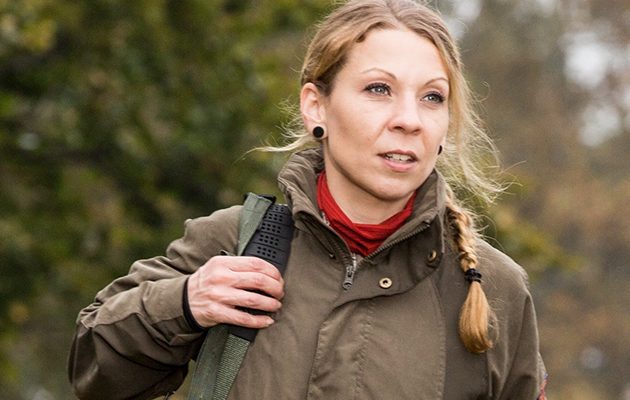With a degree in biology and PhD in molecular biology Dr Nina Krüger now works as a journalist, advocating our right to be part of the landscape
Dr Nina Krüger’s passion for hunting was sparked by a trip to a high seat with her father. With a degree in biology and PhD in molecular biology, she now works as a journalist and campaigner.
For more sporting Dianas, seriously sporting ladies offering advice and encouragement, Polly Portwin is encouraging others to speak up for the sports they love as Campaign Manager at the Countryside Alliance. And Désirée Lantz is following in the footsteps of her late father and is a qualified Professional Hunter, impressive shot and dog handler.
DR NINA KRÜGER
I am the eldest of four siblings. My father, a country vet, introduced us early to the biological order of nature and I recall vividly the day he took me roe-buck hunting for the first time. I had joined him on rabbit hunts and pigeon shoots before but rarely went with him to a high seat – probably because I was too young to sit still.
That evening, he decided to give it a try. We waited and watched and a roe buck appeared, marking its territory. My dad ordered me to cover my ears but I was already shivering and my teeth chattering – buck fever had hit me hard. The high seat was shaking so badly it was impossible for him to shoot. Luckily, this buck was meant for us. It was still beating bushes and scratching the ground by the time I had calmed down.
That night woke my passion for hunting. In summer, I went pigeon shooting with my dad after school, competing to see whose labrador could retrieve the most birds. I bred ferrets for rabbiting and made plans to take the hunting licence exam myself as early as possible. The plan was made without taking puberty into account. As a teenager, my interest in the countryside declined. I even became a vegetarian for some years, only breaking this self-imposed nutritional rule for the occasional venison dinner prepared by my mother on holidays.
Things levelled out when I finished school, and choosing biology over veterinary medicine was the extent of my rebellion against family traditions. Halfway through university my desire to hunt reawakened. While studying human evolution, I realised that I had to hunt for the meat on my plate myself if I truly wanted to deserve it.
In my childhood, small game was abundant in Northern Germany, while wild boar were still scarce. How things have changed. Diseases such as RHD [Rabbit Haemorrhagic Disease], changes in farming practices and new hunting laws have eliminated many small game species from the quarry list.

Post-doctorate, her desire to enter the political debate grew and she now speaks out as JÄGER magazine’s editor for biological and scientific topics.
The wild boar population, on the other hand, has grown massively, in common with most wild ungulate populations in Europe. In my hunting area north of Hamburg, they are now the main game besides roe deer. Wild boar are exciting and difficult to outsmart, though roe deer remain my favourite quarry. Beautiful, elegant, underestimated little warriors, I would ditch almost anything for a good stalk in the middle of summer.
When it comes to equipment, I am a purist. My rifle is a tool that I want to control to perfection. The common thought that only moving targets are difficult is fallacious in my eyes – buck fever, uneven terrain and a flinch can ruin everything if shooting has not become instinctive.
Although I have done a lot of long-range shooting on ranges, I am not a fan of shooting quarry at distances much over 100 metres. A friend of mine once said, “Anyone who shoots over 120 metres is a horrendous stalker”, and he is right. Ethical hunting for me means perfecting technique before aiming at a living object. Nevertheless, for some years, especially during my PhD research, hunting remained a hobby. When working post-doctorate, my desire to enter the political debate surrounding hunting started to grow. The field of nature conservation was now dominated by the greenies and NGOs because hunters had stayed quiet. New laws threatened many traditional hunting practices and, along with the rapidly growing wolf population in Germany, the voices claiming that human hunters are outdated become louder.
As JÄGER magazine’s editor for biological and scientific topics, I am able to speak out. My main focus is the controversial rewilding of rural landscapes. The international network of sceptics is growing every day, especially as the reintroduction of large predators into our densely populated landscapes seems to create more problems than benefits in an ecosystem that has had centuries to evolve without them. Something their proponents are unwilling to admit.
I also report regularly on latest developments in wildlife biology research. Last year, I followed the German research team of the Game Conservancy Deutschland, led by Dr Daniel Hoffmann, with a camera team at Glenogil estate in Scotland – a traditional grouse moor. The result is an impressive document about the biodiversity potential of managed landscapes, which would quickly lose their abundance of species if left unattended (view it here).
TOP TIP: Never stop learning. As hunters, it is our duty to know as much about biology as possible: population structures, breeding times, age assessment. Sound knowledge allows us to hunt ethically and sustainably. It is part of the respect we owe to nature for the bountiful table it is offering – and the best armour against critics.





